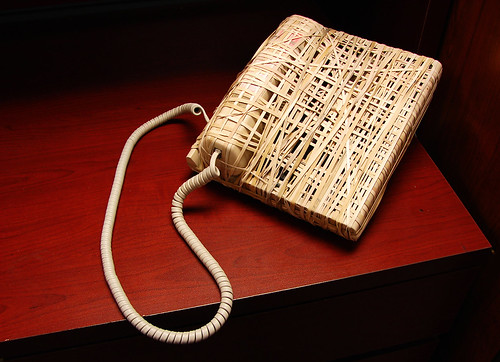"It is art that makes life, makes interest, makes importance..." - Henry James
When I was a very young person, I was deposited by my father on one of his renovation jobs. Everyone on this job was very busy and engaged in their own particular tasks - installing a handrail, grouting the kitchen bathroom, building a wall...e.t.c. I was to act as a general helper and assist everyone as the need arose.
But, instead of fulfilling my father's vision of a diligent son, I actually became the equivalent of a talking orangutan in my productivity and spent the whole time playing, wandering, and nosing about. In time, my uselessness reached a fever pitch and the foreman, a gruff bald man in suspenders, planted me in a chair next to a telephone and told me not to get up.
"This job is going to be the most important one in the house. This telephone might ring and you need to sit here and answer it. You can't leave this phone for a second, not until we leave."
I waited there all day for the phone to ring and, of course, it never did. It's quite possible that it wasn't plugged in.
It was only later did I realize that this was a punishment after a report was delivered to my father.
It didn't seem like a punishment at the time because I truly thought the task of waiting for a telephone to ring gave that waiting meaning. However, it had none in of itself.
In Waiting for Godot, Samuel Beckett strips down all context and history of his characters to create the existential situation of Vladimir and Estragon, who wait by a lonely tree in the wilderness for a man named Godot, who never comes. As time passes, they fill their time with eating, dancing, singing, crying, talking, thinking, and other mundane tasks over and over in order for them to give themselves the "impression that they exist."
There are so many ways to interpret this play. But it seems to primarily address the need to give one's self a purpose in life in order to fend off the murkiness of the future. Man has an inherent need for closure that conflicts with his inherent need to exist. Throwing one's self into the tasks of life allow one's self to forget about endings and ideals by putting one's consciousness squarely in the present moment.
When I was a very young person, I was deposited by my father on one of his renovation jobs. Everyone on this job was very busy and engaged in their own particular tasks - installing a handrail, grouting the kitchen bathroom, building a wall...e.t.c. I was to act as a general helper and assist everyone as the need arose.
But, instead of fulfilling my father's vision of a diligent son, I actually became the equivalent of a talking orangutan in my productivity and spent the whole time playing, wandering, and nosing about. In time, my uselessness reached a fever pitch and the foreman, a gruff bald man in suspenders, planted me in a chair next to a telephone and told me not to get up.
"This job is going to be the most important one in the house. This telephone might ring and you need to sit here and answer it. You can't leave this phone for a second, not until we leave."
I waited there all day for the phone to ring and, of course, it never did. It's quite possible that it wasn't plugged in.
It was only later did I realize that this was a punishment after a report was delivered to my father.
It didn't seem like a punishment at the time because I truly thought the task of waiting for a telephone to ring gave that waiting meaning. However, it had none in of itself.
In Waiting for Godot, Samuel Beckett strips down all context and history of his characters to create the existential situation of Vladimir and Estragon, who wait by a lonely tree in the wilderness for a man named Godot, who never comes. As time passes, they fill their time with eating, dancing, singing, crying, talking, thinking, and other mundane tasks over and over in order for them to give themselves the "impression that they exist."
There are so many ways to interpret this play. But it seems to primarily address the need to give one's self a purpose in life in order to fend off the murkiness of the future. Man has an inherent need for closure that conflicts with his inherent need to exist. Throwing one's self into the tasks of life allow one's self to forget about endings and ideals by putting one's consciousness squarely in the present moment.
Purpose in life is always a subjectively crafted thing. The answer isn't the same for everybody. One must decide what one's purpose is and, instead of waiting for a Godot to appear to put a cap on the story, one need only wait for one's self. Even for those of us that believe we have been given a purpose from heaven, the decision is still from within to purpose one's self in that direction.
Looking back at that day by the telephone, I remember being satisfied in the goofiest way possible. Perhaps, I am still that way.

No comments:
Post a Comment